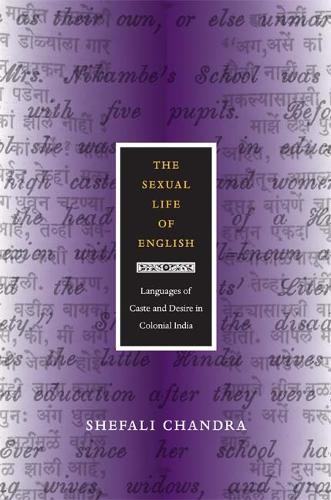Overview
In The Sexual Life of English, Shefali Chandra examines how English became an Indian language. She rejects the idea that English was fully formed before its life in India or that it was imposed from without. Rather, by drawing attention to sexuality and power, Chandra argues that the English language was produced through conflicts over caste, religion, and class. Sentiments and experiences of desire, respectability, conjugality, status, consumption, and fashion came together to create the Indian history of English. The language was shaped by the sexual experiences of Indians and by native attempts to discipline the normative sexual subject. Focusing on the years between 1850 and 1930, Chandra scrutinizes the English-education project as Indians gained the power to direct it themselves. She delves into the history of schools, the composition of the student bodies, and disagreements about curricula; the way that English-educated subjects wrote about English; and debates in English and Marathi popular culture. Chandra shows how concerns over linguistic change were popularly voiced in a sexual idiom, how English and the vernacular were separated through the vocabulary of sexual difference, and how the demand for matrimony naturalized the social location of the English language.
Full Product Details
Author: Shefali Chandra
Publisher: Duke University Press
Imprint: Duke University Press
Dimensions:
Width: 15.60cm
, Height: 1.80cm
, Length: 23.50cm
Weight: 0.426kg
ISBN: 9780822352273
ISBN 10: 0822352273
Pages: 277
Publication Date: 02 May 2012
Audience:
College/higher education
,
Postgraduate, Research & Scholarly
Format: Paperback
Publisher's Status: Active
Availability: In Print

This item will be ordered in for you from one of our suppliers. Upon receipt, we will promptly dispatch it out to you. For in store availability, please contact us.
Reviews
""The Sexual Life of English poses a significant challenge to modern Indian history, which has tended to take the links between language and culture and the gendered colonial self for granted, when engaging the latter at all. From now on, it will be impossible to grapple with liberalism, education, women, domesticity, class and caste, conjugality, nationalism, sexuality, and so much more without reckoning with Shefali Chandra's cogent, subversive arguments."" - Antoinette Burton, author of Empire in Question: Reading, Writing, and Teaching British Imperialism ""Shefali Chandra's complex rethinking of cultural theory and modern Indian history is remarkable and her major thesis, that Indian English has a brutal and loving social history of sexualization will set a model for analogous studies in other national traditions. Her breakthrough point is that English acquisition produced male cultural authority through the installation of bio-sexual difference. The point, then, is not the phallologocentrism of English as English but rather the installation of a 'native' phallogocentric power in the processes of colonization and post-colonization. The deeply researched characters that Chandra marshals to make her philosophic points are shown in all their pride, suffering, arrogance, shame, love, anger as Chandra builds her case that English was never neutral. Every one of us who has read and found wanting the orthodox position established in Subaltern Studies historiography will find The Sexual Life of English an exhilarating read, both expert and non-expert alike. With Shefali Chandra's pathbreaking work the speech of 'Indian woman' is suddenly agential."" Tani E. Barlow, author of The Question of Women in Chinese Feminism
Shefali Chandra's complex rethinking of cultural theory and modern Indian history is remarkable and her major thesis, that Indian English has a brutal and loving social history of sexualization will set a model for analogous studies in other national traditions. Her breakthrough point is that English acquisition produced male cultural authority through the installation of bio-sexual difference. The point, then, is not the phallologocentrism of English as English but rather the installation of a 'native' phallogocentric power in the processes of colonization and post-colonization. The deeply researched characters that Chandra marshals to make her philosophic points are shown in all their pride, suffering, arrogance, shame, love, anger as Chandra builds her case that English was never neutral. Every one of us who has read and found wanting the orthodox position established in Subaltern Studies historiography will find The Sexual Life of English an exhilarating read, both expert and no
The Sexual Life of English poses a significant challenge to modern Indian history, which has tended to take the links between language and culture and the gendered colonial self for granted, when engaging the latter at all. From now on, it will be impossible to grapple with liberalism, education, women, domesticity, class and caste, conjugality, nationalism, sexuality, and so much more without reckoning with Shefali Chandra's cogent, subversive arguments. --Antoinette Burton, author of Empire in Question: Reading, Writing, and Teaching British Imperialism
Author Information
Shefali Chandra is Assistant Professor in the Department of History, the International and Area Studies Program, and the Women, Gender, and Sexuality Studies Program at Washington University in St. Louis.




